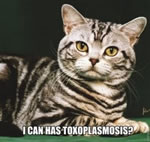
Kitteh. They sure are cute and all, but are they secretly trying to drive us all mad? That’s the premise of a new research by John Hopkins researchers:
Johns Hopkins University scientists trying to determine why people develop serious mental illness are focusing on an unlikely factor: a common parasite spread by cats.
The researchers say the microbes, called Toxoplasma gondii, invade the human brain and appear to upset its chemistry — creating, in some people, the psychotic behaviors recognized as schizophrenia. [...]
Evidence that T. gondii infections may be a cause of schizophrenia, while not yet conclusive, is growing, Yolken said. A review of past studies, published last year by Yolken and Torrey, collected a variety of intriguing correlations. For example: People with schizophrenia have a higher prevalence of T. gondii antibodies in their blood. There are unusually low rates of schizophrenia and toxoplasmosis in countries where cats are rare, and unusually high rates in places where eating uncooked meat is customary. And some adults with toxoplasmosis show psychotic symptoms similar to schizophrenia.
Studies have linked a history of toxoplasmosis with increased rates of other mental changes, too, including bipolar disorders and depression. A 2002 study in the Czech Republic noted slowed reflexes in Toxoplasma-positive people and found links between the infection and increased rates of auto accidents.
A University of Maryland study last year found that people with mood disorders who attempt suicide had higher levels of T. gondii antibodies than those who don’t try to take their own lives. Still, the links between schizophrenia and toxoplasmosis are not simple. For example, most people infected with T. gondii never become schizophrenic. And not all schizophrenics have been exposed to toxoplasma.
Yolken believes additional factors, such as an unlucky combination of genes, are probably needed to produce schizophrenia among Toxoplasma-infected people. The parasite’s DNA may also be important, since some strains are known to cause more disease.
 Kitteh. They sure are cute and all, but are they secretly trying to drive us all mad? That’s the premise of a new research by John Hopkins researchers:
Kitteh. They sure are cute and all, but are they secretly trying to drive us all mad? That’s the premise of a new research by John Hopkins researchers:
No comments:
Post a Comment